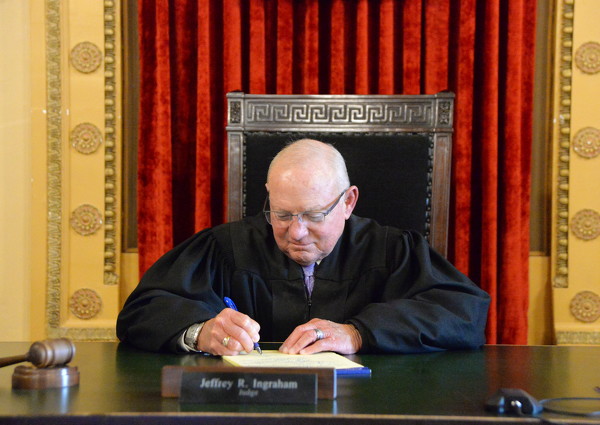Tuesday, November 8th, 2022
Judge Ingraham prepares to retire
By William Kincaid

Photo by Paige Sutter/The Daily Standard
Mercer County Common Pleas Court Judge Jeffrey R. Ingraham is nearing retirement.
CELINA - After nearly 31 years on the bench, Jeffrey R. Ingraham is staring down his final weeks as Mercer County Common Pleas Court judge.
Ingraham, 72, could not seek another term due to age limits set in the Ohio Constitution. County prosecutor Matt Fox, a Republican, is poised to succeed Ingraham as he runs unopposed in today's general election.
The court will hold an open house celebration of Ingraham's nearly three decades at the judicial helm from 1 to 4 p.m. Thursday in the common pleas courtroom on the third floor of the Mercer County Courthouse.
Ingraham views his age-mandated retirement as the beginning of a new phase.
"I've just accepted this as a change from one season to another, and though I'm not totally excited about the change - most people don't like change - I'm willing to accept it," he said.
One thing a person can control in life beyond all else is how to respond to whatever circumstance is hurled at them, Ingraham mused.
"I think sometimes people who get themselves in legal trouble because they've made bad decisions would do better in benefiting from the experience if they understood if they changed their attitude they could learn something and benefit from the experience," he said.
Still, if it weren't for the age mandate, Ingraham said he probably would have run for another term. He will serve his last day in office on Dec. 31.
With his time winding down as judge, Ingraham is keeping his nose to the grindstone in adjudicating civil and felony criminal cases.
"I'm still self-disciplined enough to understand that you need to stay focused on what you're doing in order to do a good job," Ingraham said. "I certainly have not coasted with what's been on the docket this past year and especially more recently as I wind things up and try to make sure that the dockets are clean as possible for Matt Fox as my successor."
Reflecting on his judicial career, Ingraham underscored the importance of mediation and dispute resolution in the court. The concept in the judiciary was very much in its infancy, especially in rural areas, when Ingraham first put on his robe.
The notion boils down to crafting a legal resolution that satisfies the requirements of law and holds the offender accountable and amenable to changing underlying behavior that brought them before the court in the first place.
It is carried out in the pre-trial phase.
"The only people who can solve problems are the people who have the problem," Ingraham insisted. "Using that principle, I think that's been a mantra or philosophy of this court. We are here to assist people in conflict to resolve their particular conflict in a way that they get to participate in."
Ingraham is apt to cite the guiding wisdom of Stephen R. Covey's "The 7 Habits of Highly Effective People," required reading for all potential court staff members.
"Seek first to understand, then to be understood," he said. "So for the court to impose its will and try to get people to understand the ruling you first need to understand the people involved in the conflict or the dispute."
"More often than not the lawyers are able to look at the law and the facts and come up with a resolution that seems fair to the defendant and victims, if any, that addresses the issues that the court's going to have to address at sentencing," he continued.
Should mediation in pre-trial fail, the court can resort to formal legal proceedings where it hears out each side and renders a decision.
"But that doesn't necessarily always resolve the conflict," Ingraham said.
In fact, not many cases end up going to trial. With a saturated case docket, it would be impossible to bring each case to trial, Ingraham said.
"In many cases there's nothing in dispute about the facts," he said. "The issue is what should the court do as a result of this misconduct by the individual."
The court, keeping in mind it's rule to protect society, strives to come up with a solution that stops the offender from committing the crime again.
Unfortunately, the prevalence of drugs, the breakdown of the family and lack of parental direction can sabotage efforts toward redemption.
"You need to choose to live a different lifestyle so that you're not in front of the court and causing harm to society," Ingraham said.
Asked about his sentencing methodology, Ingraham said he is guided by the law. Yet he also considers what remedy is best for the area.
"For the most part in this rural community that we live in we're fortunate enough that most of the crimes are done by people that live here," he said. "We design sentences to appropriately punish them for their behavior but also address the issue of recidivism."
In other words, the court seeks to address an individual's underlying issue to prevent them from committing future crimes, he reiterated.
"Why did you do this in the first place? What do you need help with so that you choose better the next time when confronted with the same situation?" Ingraham explained. "And so they've designed the sentencing law that most crimes that we have here … are not punishable by going to prison."
The court offers a wide range of services and resources to help get those willing back on the right track, Ingraham said.
"In our community, not that we can't always do better, it's still up to the individuals. But what we provide them, I think, is more than adequate for them to address their issues when they want to," Ingraham argued.
A large number of people involved in the legal system have rebounded as men and women with jobs who support themselves and their families.
"We've got them in treatment for their addiction whether it's drug or otherwise," he said. "They become more productive. They don't commit another crime. They've been drug free for three or four years. Their household is restored. They're back with their kids. They're back with their wife or the mother of their children or the father of their children."
There are a few people, though, whose conduct constitutes a menace to society, necessitating their separation from the community via prison, Ingraham said.
In cases where those convicted face heavy prison sentences, Ingraham said it can be agonizing to weigh the circumstances and factors to reach a right answer, one that may or may not satisfy the parties involved.
"But whatever the response to that is I do not control," he said. "I have done everything I can to come up with the answer. That's my responsibility. I'll stand by it because this is the decision I came to, and through that process I think you end up being able to sleep at night, be satisfied that you gave it your best shot."
When asked about his greatest accomplishments, Ingraham cited not a particular high-profile case but instead pointed to the court staff, which includes the probation department.
Ingraham said what he does is just the tip of the iceberg. His staff put in countless hours behind the scene to allow the court to adjudicate.
"One thing I have been satisfied with is the response I've received from all the people who have worked on the staff at the court," he said. "We've been very blessed to meld together as a staff as a whole."




